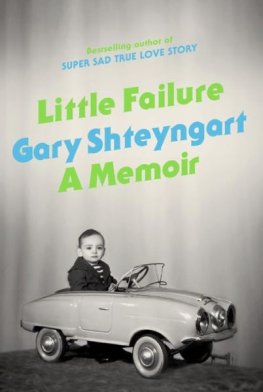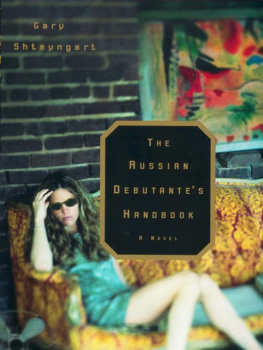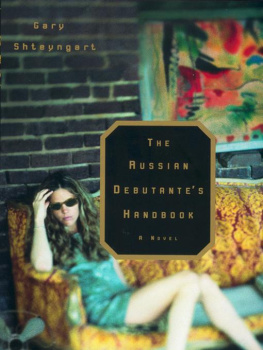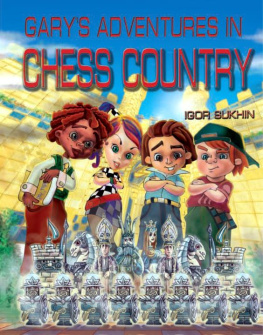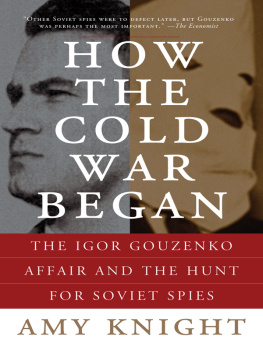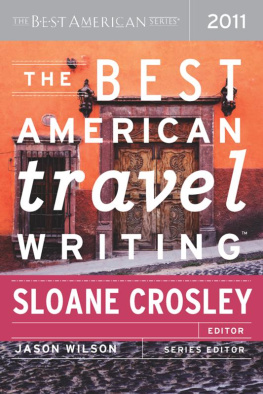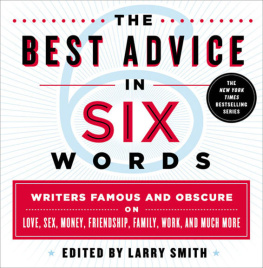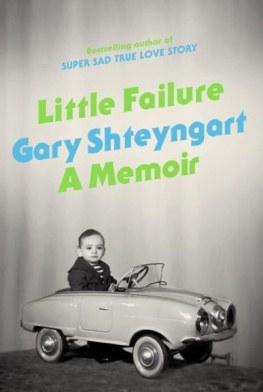Gary Shteyngart
Little Failure
To my parents the journey never ends.
To Richard C. Lacy, M.D., Ph.D.
1. The Church and The Helicopter

During a lonely period in his life, 19952001, the author tries to put his arms around a woman.
A YEAR AFTER GRADUATING COLLEGE, I worked downtown in the immense shadows of the World Trade Center, and as part of my freewheeling, four-hour daily lunch break I would eat and drink my way past these two giants, up Broadway, down Fulton Street, and over to the Strand Book Annex. In 1996, people still read books and the city could support an extra branch of the legendary Strand in the Financial District, which is to say that stockbrokers, secretaries, government functionarieseverybody back then was expected to have some kind of inner life.
In the previous year I had tried being a paralegal for a civil rights law firm, but that did not work out well. The paralegaling involved a lot of detail, way more detail than a nervous young man with a ponytail, a small substance-abuse problem, and a hemp pin on his cardboard tie could handle. This was as close as I would ever come to fulfilling my parents dreams of my becoming a lawyer. Like most Soviet Jews, like most immigrants from Communist nations, my parents were deeply conservative, and they never thought much of the four years I had spent at my liberal alma mater, Oberlin College, studying Marxist politics and book-writing. On his first visit to Oberlin my father stood on a giant vagina painted in the middle of the quad by the campus lesbian, gay, and bisexual organization, oblivious to the rising tide of hissing and camp around him, as he enumerated to me the differences between laser-jet and ink-jet printers, specifically the price points of the cartridges. If Im not mistaken, he thought he was standing on a peach.
I graduated summa cum laude and this improved my profile with Mama and Papa, but when I spoke to them it was understood that I was still a disappointment. Because I was often sick and runny nosed as a child (and as an adult) my father called me Soplyak, or Snotty. My mother was developing an interesting fusion of English and Russian and, all by herself, had worked out the term Failurchka, or Little Failure. That term made it from her lips into the overblown manuscript of a novel I was typing up in my spare time, one whose opening chapter was about to be rejected by the important writing program at the University of Iowa, letting me know that my parents werent the only ones to think that I was nothing.
Realizing that I was never going to amount to much, my mother, working her connections as only a Soviet Jewish mama can, got me a job as a staff writer at an immigrant resettlement agency downtown, which involved maybe thirty minutes of work per year, mostly proofing brochures teaching newly arrived Russians the wonders of deodorant, the dangers of AIDS, and the subtle satisfaction of not getting totally drunk at some American party.
In the meantime, the Russian members of our office team and I got totally drunk at some American party. Eventually we were all laid off, but before that happened I wrote and rewrote great chunks of my first novel and learned the Irish pleasures of matching gin martinis with steamed corned beef and slaw at the neighborhood dive, the name of which is, if I recall correctly, the Blarney Stone. Id lie there on top of my office desk at 2:00 P.M., letting out proud Hibernian cabbage farts, my mind dazed with high romantic feeling. The mailbox of my parents sturdy colonial in Little Neck, Queens, continued to bulge with the remnants of their American dream for me, the pretty brochures from graduate school dropping in quality from Harvard Law School to Fordham Law School to the John F. Kennedy School of Government (sort of like law school, but not really) to the Cornell Department of City and Regional Planning, and finally to the most frightening prospect for any immigrant family, the master of fine arts program in creative writing at the University of Iowa.
But what kind of profession is this, writer? my mother would ask. You want to be this?
I want to be this.

At the Strand Book Annex I stuffed my tote with specimens from the 50-percent-discounted trade paperbacks aisle, sifting through the discarded review copies, looking for someone just like me on the back cover: a young goateed boulevardier, a desperately urban person, obsessed with the Orwells and Dos Passoses, ready for another Spanish Civil War if only those temperamental Spanishers would get around to having one. And if I found such a doppelganger I would pray that his writing wasnt good. Because the publication pie was only so big. Surely these blue-blooded American publishers, those most Random of Houses, would see right through my overeager immigrant prose and give the ring to some jerk from Brown, his junior year at Oxford or Salamanca giving him all the pale color needed for a marketable bildungsroman.
After handing over six dollars to the Strand, I would run back to my office to swallow all 240 pages of the novel in one go, while my Russian coworkers hooted it up next door with their vodka-fueled poetry. I was desperately looking for the sloppy turn of phrase or the MFA clich that would mark the novel in question inferior to the one gestating in my office computer (idiotic working title: The Pyramids of Prague).
One day after courting gastric disaster by eating two portions of Wall Street vindaloo I exploded into the Strands Art and Architecture section, my then $29,000-a-year salary no match for the handsome price tag on a Rizzoli volume of nudes by Egon Schiele. But it wasnt a melancholic Austrian who would begin to chip away at the alcoholic and doped-up urban gorilla I was steadily becoming. It wouldnt be those handsome Teutonic nudes that would lead me on the path back to the uncomfortable place.
The book was called St. Petersburg: Architecture of the Tsars, the baroque blue hues of the Smolny Convent Cathedral practically jumping off the cover. With its six pounds of thick, glossy weight, it was, and still is, a coffee-table book. This was in itself a problem.
The woman I was in love with at the time, another Oberlin graduate (love who you know, my provincial theory), had already criticized my bookshelves for containing material either too lightweight or too masculine. Whenever she came by my new Brooklyn studio apartment, her pale midwestern eyes scanning the assembled soldiers of my literary army for a Tess Gallagher or a Jeanette Winterson, I found myself yearning for her taste and, as a corollary, the press of her razor-sharp collarbone against mine. Hopelessly, I arranged my Oberlin texts such as Tabitha Konogos Squatters & the Roots of Mau Mau next to newly found woman-ethnic gems such as Lois-Ann Yamanakas Wild Meat and the Bully Burgers, which I always imagined to be the quintessential Hawaiian coming-of-age story. (Someday I should read it.) If I bought Architecture of the Tsars I would have to hide it from this girl-woman in one of my cupboards behind a scrim of roach motels and bottles of cheap GEOGI vodka.
Other than failing my parents and being unable to finish The Pyramids of Prague, my main sorrow consisted of my loneliness. My first girlfriend ever, a fellow Oberlin student, an attractive, curly-haired white girl from North Carolina, had gone down south to live with a handsome drummer in his van. I would spend four years after graduating college without so much as kissing a girl. Breasts and backsides and caresses and the words I love you, Gary lived on only in abstract memory. Unless Im telling you otherwise, I am completely in love with everyone around me for the rest of this book.

